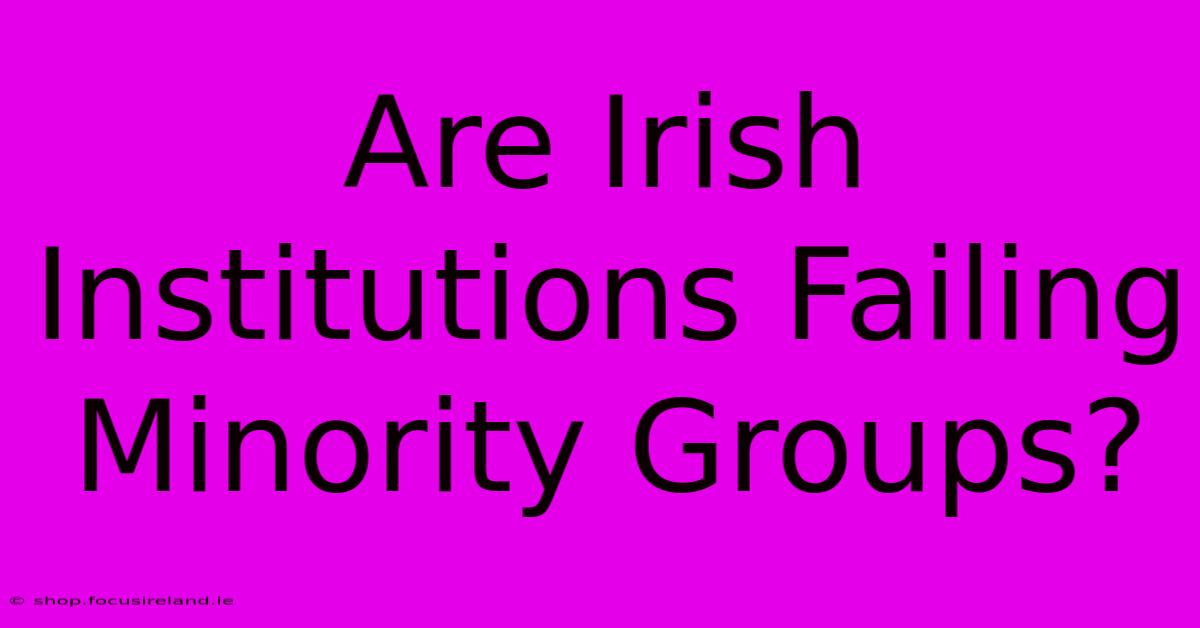Are Irish Institutions Failing Minority Groups?

Table of Contents
Are Irish Institutions Failing Minority Groups?
Ireland, often lauded for its progressive social policies, faces increasing scrutiny regarding its treatment of minority groups. While the country has made strides in promoting inclusivity, persistent inequalities suggest systemic failings within its institutions. This article examines the evidence, exploring whether Irish institutions are adequately supporting and representing minority communities.
The Complexities of Measuring Institutional Failure
Defining "failure" in this context is crucial. It's not simply about the absence of overt discrimination, but about the pervasive effects of historical biases and systemic disadvantages embedded within societal structures. This includes examining whether institutions are effectively addressing the unique challenges faced by minority groups, promoting equitable outcomes, and ensuring meaningful participation in all aspects of Irish life.
Key Areas of Concern:
-
Ethnic Minorities: While Ireland has seen a significant increase in ethnic diversity, many immigrants and their children experience challenges in accessing education, employment, and healthcare. Reports highlight disparities in educational attainment, higher unemployment rates, and overrepresentation in lower-paying jobs. Language barriers, cultural differences, and potential discrimination within the workplace and educational systems contribute to these inequalities.
-
Traveller Community: The Traveller community, a nomadic ethnic group, continues to face significant marginalization and discrimination. Access to adequate housing, education, and healthcare remains a persistent issue. Historical prejudices and societal misconceptions fuel stigmatization and prevent the community from fully participating in Irish society. The systemic nature of this marginalization is a major concern.
-
LGBTQ+ Community: Despite significant legal advancements in LGBTQ+ rights, challenges persist. While same-sex marriage is legal, issues like hate crime, discrimination in employment and housing, and access to appropriate healthcare, remain prevalent. Furthermore, the representation of LGBTQ+ individuals within key institutions needs further improvement to ensure their voices are heard and their needs are adequately addressed.
-
People with Disabilities: Ireland has made progress in promoting disability rights, yet significant barriers remain. Access to adequate support services, employment opportunities, and inclusive infrastructure continues to lag behind. The experience of disability discrimination in education, employment, and social participation requires ongoing attention.
Evidence of Institutional Shortcomings:
Several factors point towards institutional shortcomings:
-
Data Collection and Analysis: The lack of comprehensive and disaggregated data makes it difficult to accurately assess the extent of inequality experienced by different minority groups. Without robust data, effective policy interventions are hampered.
-
Policy Implementation: While progressive policies exist on paper, their effective implementation varies significantly. A lack of resources, ineffective monitoring, and a failure to adequately address underlying societal biases hinder progress.
-
Cultural Attitudes and Implicit Bias: Despite legal protections, ingrained societal prejudices and implicit biases within institutions continue to impact the experiences of minority groups. Addressing these requires a comprehensive approach that includes education, awareness-raising, and proactive measures to counter discrimination.
Recommendations for Improvement:
Addressing these challenges necessitates a multi-pronged approach:
-
Improved Data Collection: Gathering more comprehensive and granular data is essential for accurate assessment and effective policymaking.
-
Strengthening Enforcement Mechanisms: Robust enforcement of anti-discrimination legislation is crucial to ensuring accountability and deterring discriminatory practices.
-
Investing in Targeted Support Programs: Increased investment in programs tailored to the needs of specific minority groups can help address disparities in education, employment, and healthcare.
-
Promoting Cultural Awareness and Sensitivity Training: Educating individuals within institutions about the experiences and challenges of minority groups is paramount in building a more inclusive society.
-
Increased Minority Representation: Ensuring diverse representation within institutions at all levels is critical for meaningful change.
Conclusion:
While Ireland has made advancements in promoting inclusivity, the evidence suggests that its institutions are still failing to fully support and represent minority groups. Addressing these systemic inequalities requires a sustained commitment to robust data collection, effective policy implementation, and a concerted effort to challenge ingrained biases and promote genuine equality. Only through such comprehensive action can Ireland truly live up to its aspiration of being an inclusive and equitable society for all its citizens.

Thank you for visiting our website wich cover about Are Irish Institutions Failing Minority Groups?. We hope the information provided has been useful to you. Feel free to contact us if you have any questions or need further assistance. See you next time and dont miss to bookmark.
Featured Posts
-
Dingle Property Make Dingle Your Home
Apr 04, 2025
-
Top Irish Wedding Venues Unparalleled Views
Apr 04, 2025
-
Wexford Towns Hidden Gem A Unique B And B Experience
Apr 04, 2025
-
Secluded Glendalough Retreats Find Your Peaceful Sanctuary
Apr 04, 2025
-
The Anderson Estate A 2001 Irish Social Commentary
Apr 04, 2025
